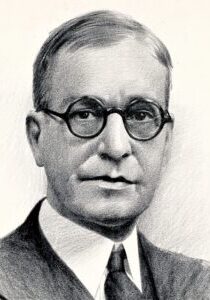People
Notable People
Newton D. Baker - Sectretary of War and Mayor of Cleveland
343 Bratenahl Road

Newton D Baker Jr. was a lawyer, politician, and government official. He served as the 37th mayor of Cleveland from 1912 to 1915 and as U.S. Secretary of War from 1916 to 1921.
Baker became an ally of Mayor Tom Johnson and was appointed City of Cleveland law director in 1902 and as city solicitor from 1901 to 1909 before serving two terms as mayor of Cleveland from 1912 to 1916. Declining to run for a 3d term as mayor in 1916, he retired to practice law, founding the law firm of Baker, Hostetler & Sidlo, which later became Baker & Hostetler.
Baker supported Woodrow Wilson at the 1912 Democratic Convention. He declined Wilson's offer to be secretary of the interior in 1913, preferring to remain Cleveland's mayor. Two months after his retirement in 1916, he accepted an appointment as secretary of war in Wilson's cabinet. He stated that he was so much of a pacifist that “he would fight for peace,”
When the U.S. entered World War I, Baker was responsible for drafting, organizing, and outfitting an army of two million men as quickly as possible. He selected General John J. Pershing to command the American Expeditionary Forces, which he insisted act as an independent unit.
When the war ended, he was responsible for demobilizing the troops and negotiating the cancelation of war contracts. Baker left Washington in the spring of 1921 and rented the home at 343 East 105th Street (Bratenahl Road) from the widow of Clifford Neff. He rejoined Baker & Hostetler, the law firm he co-founded.
He was a strong supporter of the League of Nations and continued to advocate American participation in the League during the 1920s. In 1928, he was appointed by President Calvin Coolidge to the Permanent Court of Arbitration at The Hague, and in 1929 President Herbert Hoover named him to the Law Enforcement Commission.
He was a candidate for the presidential nomination at the 1932 Democratic National Convention, but the convention chose Franklin D. Roosevelt.
Newton Diehl Baker Jr. was born on December 3, 1871, in Martinsburg, West Virginia, the son of Newton and Mary Ann Baker Sr. Baker attended school in Martinsburg and finished college preparatory training at Episcopal High School in Alexandria, Virginia. He graduated from Johns Hopkins University in 1892 and received a law degree from Washington and Lee University in 1894.
After graduating from law school, he tried for a year to establish a law practice in Martinsburg. He then moved to Washington D.C. to become a private secretary to Postmaster General William Wilson until June 1897. Following a European vacation, he came to Cleveland in 1899 to become a junior partner at Foran, McTigne, and Baker.
On July 5, 1902, Baker married Elizabeth Wells Leopold, a faculty member at Wilson College. They had three children: Margaret (Wright), Elizabeth (McGean), and Newton (Jack) Baker III. Elizabeth and Newton attended the Bratenahl School.
Baker was active on many institutional, charitable, educational, and corporate boards and committees. He received the Cleveland Chamber of Commerce Medal for public service in 1927 and the U.S. Distinguished Service Medal in 1928. He authored Why We Went to War (1936).
After a longstanding heart condition, Baker died of a cerebral hemorrhage at his Shaker Heights home on Christmas Day 1937. After lying in state with full military honors at Trinity Cathedral, Baker was buried in Lake View Cemetery. Elizabeth died on August 24, 1951, and was buried alongside her husband.
